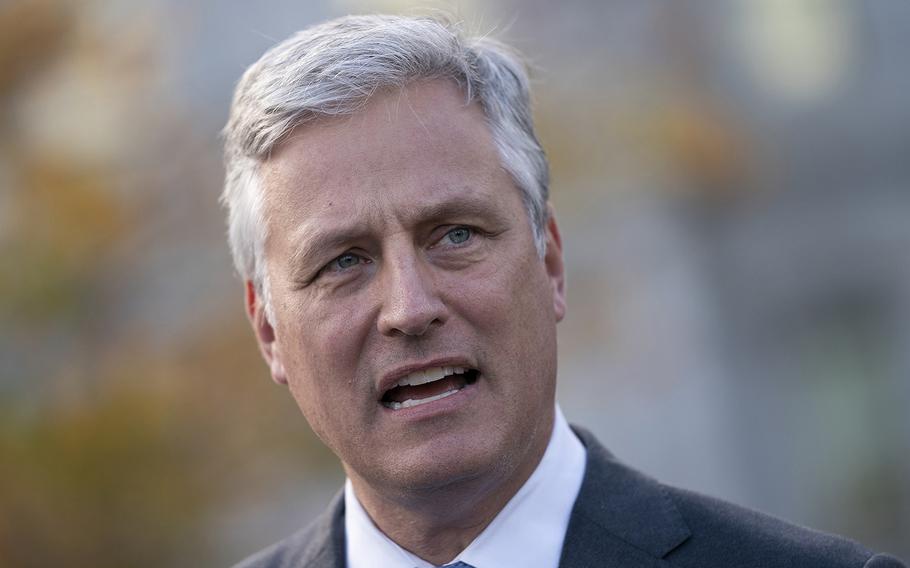
Then-national security adviser Robert O’Brien speaks to reporters outside the White House in November 2020. (Drew Angerer, Getty Images/TNS)
If Donald Trump returns to the White House, he should sever all economic ties with China, consider deploying the entire U.S. Marine Corps to Asia and resume live nuclear weapons testing, his former national security adviser writes in an article offering the most detailed account of what foreign policy may look like in a second Trump term.
The proposals are spelled out in an article set to appear in Foreign Affairs magazine written by Trump’s last national security adviser, Robert O’Brien, who may get another top job if Trump wins a new term as president in November. While O’Brien was a hard-liner and helped fuel the tougher stance toward China that emerged late in Trump’s time in office, the prescriptions he spells out go far beyond anything he publicly advocated at the time.
“As China seeks to undermine American economic and military strength, Washington should return the favor,” O’Brien writes in the article’s most explosive policy prescription, saying that “Washington should, in fact, seek to decouple its economy from China’s.”
There’s no guarantee Trump would adhere to the policy proposals on China that O’Brien lays out in the article, especially one that would have such a seismic impact for the U.S. and the world given how interwoven the two countries’ economies have become.
But O’Brien said recently that he remains in “regular contact” with the former president, and he’s taken the public stage more often in recent months, meeting with Prime Minister Benjamin Netanyahu in Israel and criticizing President Joe Biden for what he considered an insufficient response to attacks on U.S. troops in Iraq and Syria.
The article is only the latest in a series of such initiatives from former Trump administration officials and conservative think tanks. But O’Brien’s previous role and the prospect of his return give it more weight than others.
Christian Whiton, a State Department political appointee under Presidents George W. Bush and Trump who helped O’Brien produce the article, said O’Brien gave a copy to Trump campaign adviser Susie Wiles. Whiton said Wiles showed a printed copy to Trump.
But Karoline Leavitt, a Trump campaign representative, disputed that account, saying it wasn’t true that Wiles had shown the article to the former president.
“Let us be very specific here: unless a message is coming directly from President Trump or an authorized member of his campaign team, no aspect of future presidential staffing or policy announcements should be deemed official,” Wiles and Chris LaCivita, a campaign senior adviser, said in a statement that Leavitt provided on Monday evening.
At more than 5,000 words, the article — “The Return of Peace Through Strength: Making the Case for Trump’s Foreign Policy” — argues that the 60% tariffs on China that Trump has floated should be only the first step, followed by tougher export controls “on any technology that might be of use to China” and other measures.
“This morass of American weakness and failure cries out for a Trumpian restoration of peace through strength,” O’Brien writes.
He also advocates a military challenge to China beyond the additional attention the Biden administration has paid to the Asia-Pacific region. O’Brien argues for the U.S. to help expand the militaries of Indonesia, the Philippines and Vietnam, increase military assistance to Taiwan and boost missile defense and fighter jet protection in the region.
O’Brien calls for a complete reorientation of U.S. forces, saying the U.S. should consider deploying all its 177,000 Marines to the Pacific region, “relieving it in particular of missions in the Middle East and North Africa.”
Nuclear Tests, Ukraine
The U.S. should strengthen its nuclear arsenal by conducting underground nuclear tests for the first time since a self-imposed ban in 1992, and he argues the U.S. should resume production of uranium-235 and plutonium-239 “if China and Russia continue to refuse to engage in good-faith arms control talks.”
Trump has said he’d end the war in Ukraine within 24 hours. O’Brien writes in the article that Trump has “made clear that he would like to see a negotiated settlement to the war that ends the killing and preserves the security of Ukraine.”
He writes that Trump’s approach “would be to continue to provide lethal aid to Ukraine, financed by European countries, while keeping the door open to diplomacy with Russia — and keeping Moscow off balance with a degree of unpredictability.”
There are moves O’Brien doesn’t call for, and that may be a pleasant surprise to uneasy allies. There’s no mention of withdrawing from NATO — in fact, he says Trump made the defense alliance stronger by demanding that European governments spend more on defense.
O’Brien calls on NATO to rotate ground and air forces to Poland to boost its capabilities close to Russia’s border “and to make unmistakably clear that the alliance will defend all its territory from foreign aggression.”
O’Brien also takes on what he sees as the Pentagon’s bloated procurement policies. He advocates a push toward “nimble newer defense suppliers such as Anduril and Palantir,” companies that he says are “rooted in the innovative tech sector” to get away from costly and unnecessary programs.
“There was no authoritative preview of Trump foreign policy 2016,” Whiton said of O’Brien’s thinking about the article. “The audience is foreigners and the establishment. As much as Trump views himself as an insurgent, there’s utility in calming things down and providing some things. I think you’re seeing that.”
With assistance from Stephanie Lai.
©2024 Bloomberg L.P.
Visit bloomberg.com
Distributed by Tribune Content Agency, LLC.